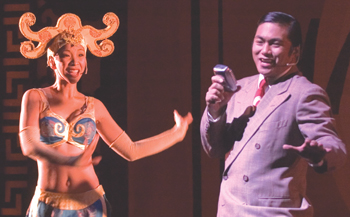![[Metroactive Stage]](/stage/gifs/stage468.gif)
[ Stage Index | Silicon Valley | Metroactive Home | Archives ]

Photograph by Kevin Verne Excluded Clubbers Nicole A. Tung and Erwin Urbi play 1940s performers in 'Making Tracks.' Making Tracks Into the Future SJ Rep charts the course of Asian immigration in rock epic By Marianne Messina THE PRODUCTION OF Welly Yang's Making Tracks at the San Jose Repertory Theatre traces two Asian family sagas—one Japanese and one Chinese—over the course of 150 years in a huge epic of a rock musical. And that's just Act 1. In putting the proverbial human face on historical realities, this is the kind of production that makes you realize how almost everyone reading this article will be referred to in future history books as "the masses." Now that I've got that off my chest, Making Tracks pulls on the heartstrings, even if the recent overabundance of immigrant-tribulation stories has left one immune to their appeal. The story focuses on how families deal with inordinately human questions: How to let go of history vs. how to honor it; how to build a life in spite of imperfections or risks; whether to take arms against a sea of troubles or to make do and continue putting one foot in front of the other "rail by rail." With rock musician Woody Pak's sometimes overly sweetened musical score (subdued in this production by draining off the live band's sound into the sound system), the story of Dylan's Japanese and Chinese parentage starts in the Sierra Nevada of 1865. The Chinese-born railroad laborers in uniformly dun tunics and trousers (Lydia Tanji, costumer) are represented in ensemble song-and-dance numbers dominated by choreographed pick-axing (Joey McKneely, choreographer). As the history unfolds, you kind of need a family tree chart to follow it, especially since the actors play multiple roles, often switching from Japanese in one generation to Chinese in the next. (Is that a salute to "We are the world" or a nudge at "They can't tell the difference"?) Part of the confusion may stem from the fact that the original version of the play was a series of separate vignettes. There's Miyuki (Mimosa), a "picture bride" who came from Japan in 1918 to marry a man she'd never met. There's the Japanese internment camp in Wyoming and the Chinese-American San Francisco nightclub in the 1940s when discrimination kept Asian song-and-dance talent out of mainstream theater. The play's recently added frame of a contemporary grandfather yearning to pass this history on to his self-exiled grandson Dylan holds the historical vignettes together through Act 1. Act 2 shifts its focus to Dylan (Michael K. Lee), a rock musician in the youthful throes of existential angst. (Glimpsing Dylan and his struggles in Act 1 might unify the acts a bit more.) The show is long, but with never a dull moment, and Act 2 lightens up, greasing the minutes with great smears of humor—the grace under cantankerousness of Grandpa (a loudly applauded Joseph Foronda), a coffee-shop scene where the contemporary Grace (lovely, mellifluous Marie-France Arcilla) and Dylan try to discuss their relationship while a chorus of meddling friends gesticulates behind them. Helped along by excellent singing (though sometimes overreaching and overloud) and acting, Making Tracks speaks universally about progress. Actress Mimosa, as Dylan's mom, fully inhabits the former Berkeley protester and current foundation president, inspiring pride in women's hard-won political power. Lee's brooding but sweet Dylan inspires pride in the mobility and financial independence we've achieved—sons and daughters now have the luxury of relocating 3,000 miles just to "find out who they are"—and they can return home. We've all come from families once tied to the dirt or to ceaseless labor or to tiny insular communities, and Making Tracks congratulates us all for opening culture up, taking risks and thinking big.
Making Tracks, a San Jose Repertory Theatre production, plays Wednesday at 8pm (with an added noon show April 13), Thursday-Friday at 8pm, Saturday at 3 and 8pm and Sunday at 2 and 7pm (no 2pm show April 17) through April 17 at San Jose Rep, 101 Paseo de San Antonio, San Jose. Tickets are $22-$52. (408.367.7255)
Send a letter to the editor about this story to letters@metronews.com. [ Silicon Valley | Metroactive Home | Archives ]
|
From the March 30-April 5, 2005 issue of Metro, Silicon Valley's Weekly Newspaper.
Copyright © Metro Publishing Inc. Metroactive is affiliated with the Boulevards Network.
For more information about the San Jose/Silicon Valley area, visit sanjose.com.